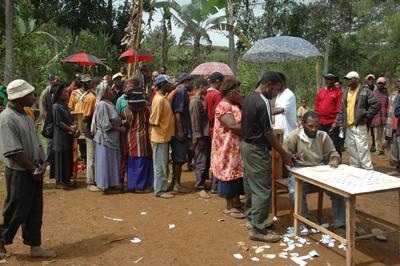But no one party has ever won enough seats to rule outright in the single-chamber parliament, resulting in a high degree of political instability, seemingly endless cabinet reshuffles and a series of votes of no confidence. Although Prime Minister Peter O’Neill’s 101-seat alliance suggests a recent degree of political stability, it was not until 2007 — three decades after independence — that a PNG government completed a full five-year term in office.
Amid the calls for change that will inevitability arise from the CLRC’s public consultations, it is worth examining some of the benefits of PNG’s Westminster system. At its broadest, PNG’s parliament serves as a ‘shock absorber’ for the nation’s 1000-plus cultural groups. Parliament has endured as the national forum for law-making despite some extremely destabilising events — in particular, the 1997 Sandline Affair and the decade-long Bougainville Crisis, which put tremendous strain on the PNG state and the government of Sir Julius Chan.
The way elections interact with the Westminster system in PNG is important. Elected representatives have been chosen by public consent — through eight unbroken national elections — to form the 111-seat parliament. Scattered instances of voter irregularities and violence are common at each national election, but the integrity of the electoral system remains robust. PNG has changed its voting system multiple times, from optional preferential voting to first-past-the-post (implemented in 1975) and a limited preferential system (commencing in 2001). PNG elections, which take place every five years, regularly result in many members of parliament failing to regain their seats, which suggests the electoral system facilitates accountability.
Exposing the executive branch of government to the rigours of parliament acts as a check on one particular group or individual dominating the political landscape. By contrast, a president or directly elected prime minister could potentially alter and limit parliamentary exposure and scrutiny. PNG prime ministers of varying stripes have had to persistently strike deals and compromise rather than force the country in one particular direction.
Transplanting a Westminster system onto a post-colonial, heterogeneous society has had obvious difficulties. In many ways, it has stoked corruption. For example, an MP’s election to the national parliament does not always mean wide and inclusive representation, but endless rounds of patronage service and deal making. The primary objective of not just MPs but also the entire government can at times become ‘feathering one’s nest’ rather than producing decent national outcomes.
It may be the case that a president or directly elected prime minister in PNG would help dispel some of these concerns and deliver more decisive outcomes. The allure of economic strongmen like Singapore’s Lee Kuan Yew or, from the perspective of broader governance, Turkey’s Kemal Ataturk illustrate some of the benefits that are possible when economic authoritarians possess overwhelming state power. PNG, after all, desperately needs good roads, schools and hospitals. It is assumed that a directly elected prime minister would replace excess compromise and deal-making with decisive and clear action.
But advocates of the Westminster system should recognise that post-colonial states that try to shed their Westminster legacies do not always fare well. Zimbabwe, for example, got rid of its Westminster system in 1987 and the results, when combined with other factors, are not appealing. In the 1970s, the Solomon Islands tried a quieter and less brazen experiment in redirecting its Westminster system towards a governing council that dispersed executive functions across a series of committees. Following criticisms of secrecy and a lack of leadership, the Solomon Islands reverted to a Westminster system with a chief minister and council of ministers after only four years.
If PNG is concerned mainly with stability then recent changes to national governance arrangements may be the best compromise. O’Neill, for example, recently took steps to limit votes of no confidence, which is a decent step in limiting constant changes in government while maintaining the Westminster machinery. However, as one recent article suggests, similar moves over the past decade have had a tendency to undermine the effectiveness of the legislature.
There will be many strong arguments put forward, both for and against the future of the Westminster system, while the CLRC conducts public consultations. During this process, it is worth recalling that the Westminster system has been a valuable system for PNG during the past four decades. There is a strong case to be made for a directly elected prime minister in PNG but, as the saying goes, the future may be a case of ‘be careful what you wish for’.
Sean Jacobs is the co-founder of New Guinea Commerce and has worked with all levels of government in PNG

